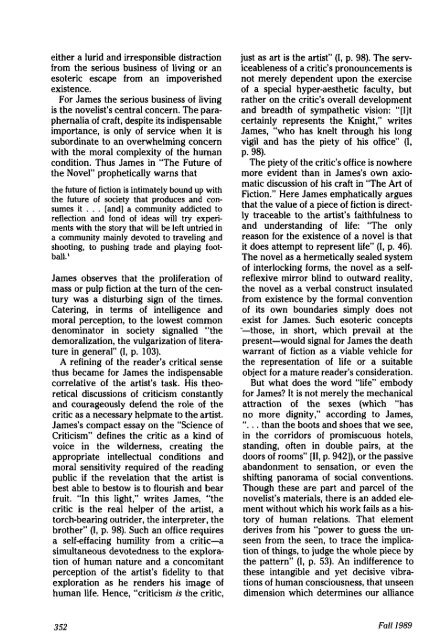The Critical Voice of Henry James Stephen Gurney
The Critical Voice of Henry James Stephen Gurney
The Critical Voice of Henry James Stephen Gurney
You also want an ePaper? Increase the reach of your titles
YUMPU automatically turns print PDFs into web optimized ePapers that Google loves.
either a lurid and irresponsible distraction<br />
from the serious business <strong>of</strong> living or an<br />
esoteric escape from an impoverished<br />
existence.<br />
For <strong>James</strong> the serious business <strong>of</strong> living<br />
is the novelist’s central concern. <strong>The</strong> para-<br />
phernalia <strong>of</strong> craft, despite its indispensable<br />
importance, is only <strong>of</strong> service when it is<br />
subordinate to an overwhelming concern<br />
with the moral complexity <strong>of</strong> the human<br />
condition. Thus <strong>James</strong> in “<strong>The</strong> Future <strong>of</strong><br />
the Novel” prophetically warns that<br />
the future <strong>of</strong> fiction is intimately bound up with<br />
the future <strong>of</strong> society that produces and con-<br />
sumes it . . . [and] a community addicted to<br />
reflection and fond <strong>of</strong> ideas will try experi-<br />
ments with the story that will be left untried in<br />
a community mainly devoted to traveling and<br />
shooting, to pushing trade and playing foot-<br />
ball.’<br />
<strong>James</strong> observes that the proliferation <strong>of</strong><br />
mass or pulp fiction at the turn <strong>of</strong> the cen-<br />
tury was a disturbing sign <strong>of</strong> the times.<br />
Catering, in terms <strong>of</strong> intelligence and<br />
moral perception, to the lowest common<br />
denominator in society signalled “the<br />
demoralization, the vulgarization <strong>of</strong> litera-<br />
ture in general” (I, p. 103).<br />
A refining <strong>of</strong> the reader’s critical sense<br />
thus became for <strong>James</strong> the indispensable<br />
correlative <strong>of</strong> the artist’s task. His theo-<br />
retical discussions <strong>of</strong> criticism constantly<br />
and courageously defend the role <strong>of</strong> the<br />
critic as a necessary helpmate to the artist.<br />
<strong>James</strong>’s compact essay on the “Science <strong>of</strong><br />
Criticism” defines the critic as a kind <strong>of</strong><br />
voice in the wilderness, creating the<br />
appropriate intellectual conditions and<br />
moral sensitivity required <strong>of</strong> the reading<br />
public if the revelation that the artist is<br />
best able to bestow is to flourish and bear<br />
fruit. “In this light,” writes <strong>James</strong>, “the<br />
critic is the real helper <strong>of</strong> the artist, a<br />
torch-bearing outrider, the interpreter, the<br />
brother” (I, p. 98). Such an <strong>of</strong>fice requires<br />
a self-effacing humility from a critic-a<br />
simultaneous devotedness to the explora-<br />
tion <strong>of</strong> human nature and a concomitant<br />
perception <strong>of</strong> the artist’s fidelity to that<br />
exploration as he renders his image <strong>of</strong><br />
human life. Hence, “criticism is the critic,<br />
just as art is the artist” (I, p. 98). <strong>The</strong> serv-<br />
iceableness <strong>of</strong> a critic’s pronouncements is<br />
not merely dependent upon the exercise<br />
<strong>of</strong> a special hyper-aesthetic faculty, but<br />
rather on the critic’s overall development<br />
and breadth <strong>of</strong> sympathetic vision: “[llt<br />
certainly represents the Knight,” writes<br />
<strong>James</strong>, “who has knelt through his long<br />
vigil and has the piety <strong>of</strong> his <strong>of</strong>fice” (1,<br />
p. 98).<br />
<strong>The</strong> piety <strong>of</strong> the critic’s <strong>of</strong>fice is nowhere<br />
more evident than in <strong>James</strong>’s own axio-<br />
matic discussion <strong>of</strong> his craft in “<strong>The</strong> Art <strong>of</strong><br />
Fiction.99 Here <strong>James</strong> emphatically argues<br />
that the value <strong>of</strong> a piece <strong>of</strong> fiction is direct-<br />
ly traceable to the artist’s faithfulness to<br />
and understanding <strong>of</strong> life: “<strong>The</strong> only<br />
reason for the existence <strong>of</strong> a novel is that<br />
it does attempt to represent life” (I, p. 46).<br />
<strong>The</strong> novel as a hermetically sealed system<br />
<strong>of</strong> interlocking forms, the novel as a self-<br />
reflexive mirror blind to outward reality,<br />
the novel as a verbal construct insulated<br />
from existence by the formal convention<br />
<strong>of</strong> its own boundaries simply does not<br />
exist for <strong>James</strong>. Such esoteric concepts<br />
--those, in short, which prevail at the<br />
present-would signal for <strong>James</strong> the death<br />
warrant <strong>of</strong> fiction as a viable vehicle for<br />
the representation <strong>of</strong> life or a suitable<br />
object for a mature reader’s consideration.<br />
But what does the word ‘‘life’’ embody<br />
for <strong>James</strong>? It is not merely the mechanical<br />
attraction <strong>of</strong> the sexes (which “has<br />
no more dignity,” according to <strong>James</strong>,<br />
“. . . than the boots and shoes that we see,<br />
in the corridors <strong>of</strong> promiscuous hotels,<br />
standing, <strong>of</strong>ten in double pairs, at the<br />
doors <strong>of</strong> rooms” [II, p. 942]), or the passive<br />
abandonment to sensation, or even the<br />
shifting panorama <strong>of</strong> social conventions.<br />
Though these are part and parcel <strong>of</strong> the<br />
novelist’s materials, there is an added ele-<br />
ment without which his work fails as a his-<br />
tory <strong>of</strong> human relations. That element<br />
derives from his “power to guess the un-<br />
seen from the seen, to trace the implica-<br />
tion <strong>of</strong> things, to judge the whole piece by<br />
the pattern” (I, p. 53). An indifference to<br />
these intangible and yet decisive vibra-<br />
tions <strong>of</strong> human consciousness, that unseen<br />
dimension which determines our alliance<br />
352 Fall 1989
















